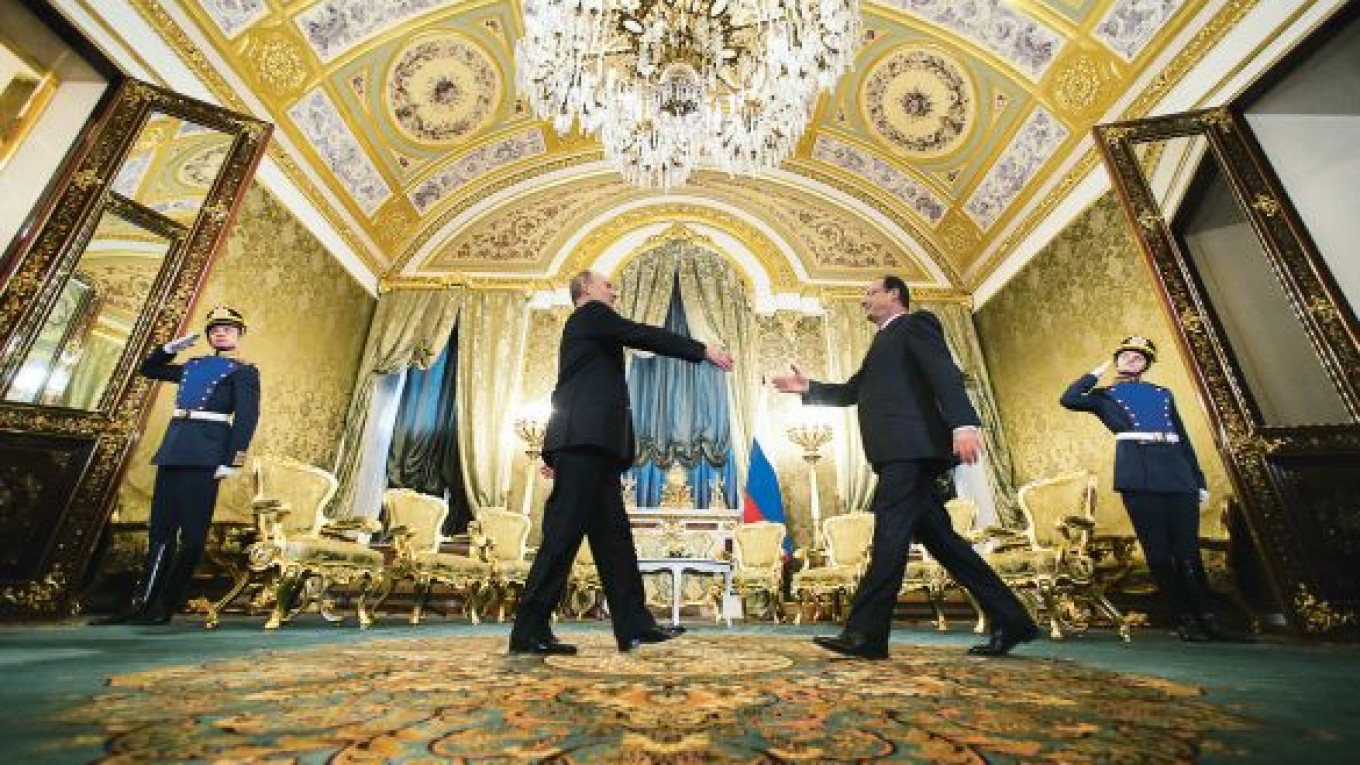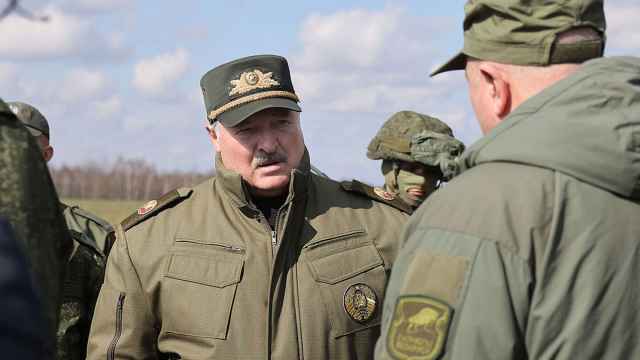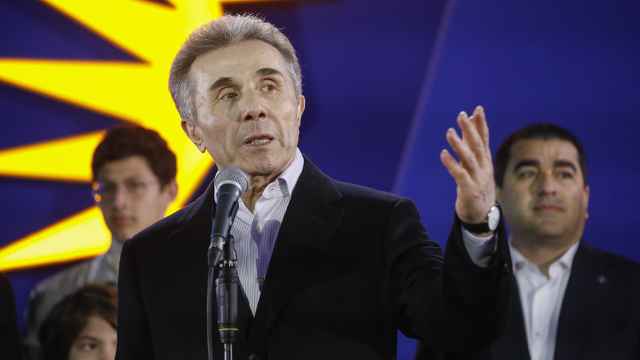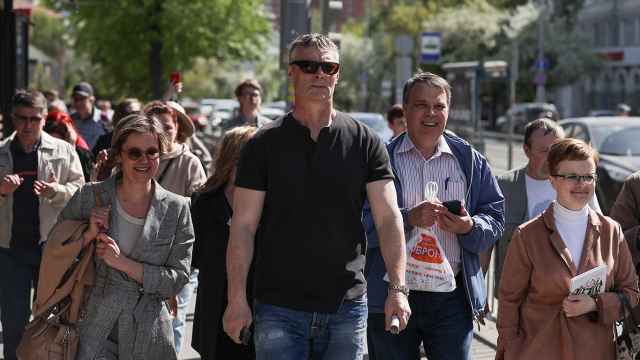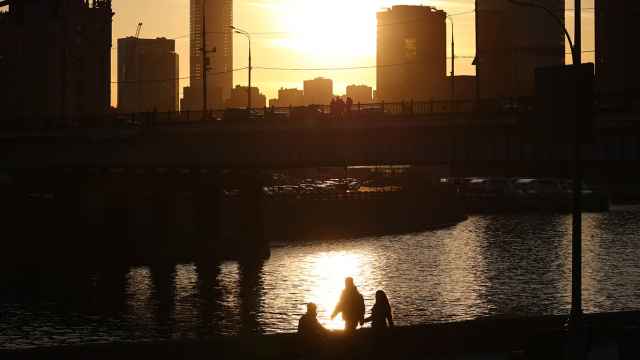President Vladimir Putin on Thursday hosted his French counterpart Francois Hollande for four-hour-long talks in the Kremlin, which diplomats said were direct and productive.
Hollande's first visit since the socialist was elected president in May was preceded by expectations that the French leader would challenge his host on democracy and human rights. Meanwhile, Hollande conducted the first-ever meeting between a French president and his country's business leaders in Russia prior to heading to his meeting with Putin.
Both leaders appeared relaxed and businesslike at a joint Kremlin news conference late Thursday. Putin began his talks with the French president by calling France a "longtime privileged partner," while Hollande spoke of "strong historical ties" and added that "we are responsible for the future," according to a Kremlin transcript
When a reporter confronted the presidents by saying that 2012 was the worst year for human rights violations in the country's recent history, Putin responded by saying that there were "no particular issues with human rights in Russia" last year, just election-related disputes.
Putin said the country had seen two campaigns, the state Duma elections in December 2011 and the presidential election in March. "Big election campaigns always result in a tougher political contest" and "talk about violations," he said.
However, Putin continued by saying that "Russia has chosen democracy and respect for human rights and is not prepared to leave this path," according to Itar-Tass.
The French leader said he won't judge but just state facts. "If there are any violations, I speak about that openly, to correct the situation and not to attack and hit," he said.
However, he was scheduled to meet with rights activists and opposition members in the French Embassy on late Thursday.
Putin admitted that there was lingering disagreement over Syria, but said he was ready to discuss new suggestions made by Hollande to end the ongoing bloodshed in the Middle East country.
"I believe for this we need not only a bottle of good wine but a bottle of vodka. We need to sit down and think over it," he said.
Hollande retorted that a bottle of port would be better.
The French President said the negotiations should be widened to include parties that could act as negotiators between President Bashar Assad and opposition rebels. Moscow has been Assad's staunchest ally and opposes any joint action of the United Nations Security Council on Syria.
The news conference began two hours later than planned because bilateral talks had gone on longer than planned. "This is not a bad sign," a senior French diplomat told The Moscow Times. The talks had been "frank and direct" the diplomat added, requesting anonymity under embassy policy.
Both leaders oversaw the signing of a number economic cooperation agreements, including a deal between the government's investment vehicle, the Russian Direct Investment Fund, Vneshekonombank and French financial group Caisse des Depots et Consignations to attract some $1 billion investment in each country, Interfax reported, citing a source close to one of the sides involved in the deal.
Both countries also agreed on a joint venture to develop satellite systems and signed deals between Russian Railways and France's SNCF state railway company, as well as between French drug maker Sanofi Aventis and Russia's Health and Social Development Ministry.
In the morning, Hollande met with French businessmen working in Russia, in what analysts said was an indication that economic cooperation will become a priority.
Hollande met with senior executives of French firms present on the Russian market — both global majors and those representing small- and medium-size business.
The list of the biggest French investors here includes carmakers Renault and PSA Peugeot-Citroen, oil giant Total, cosmetics maker L'Oreal and cement producer Lafarge.
The meeting is a significant milestone in the two countries' economic relations, since Hollande is the first French president who met with the French business community in Russia, said Philippe Pegorier, president of French transportation and machinery giant Alstom in Russia.
"It's important that the president got the idea of what our working conditions in Russia look like and what our concerns are," said Pegorier, who was present at the meeting.
Hollande's agenda in Moscow indicates that economic issues, which have always played a secondary role in the two countries' relations compared with politics, are now becoming another priority, said Arnaud Dubien, director of French-Russian research center L'Observatoire.
Under Hollande, France is expected to continue developing mutual trade with Russia, which stood at about $24 billion last year.
"There are good conditions for that: Big French companies have presence across all the major industries in Russia, and they are interested in its big potential as an industrial nation," Dubien said.
He added that the French president's message to the business community was clear: Hollande took personal responsibility for helping French companies develop in Russia.
At the meeting French businessmen asked their president to help facilitate an easier visa regime between the two countries, since this issue remains one of the major factors hampering cooperation.
The other concern voiced by foreign investors was the need to improve Russia's image in France, in order to boost investment.
Although Russia has its work cut out for it to improve its image globally, one reason for a negative reputation is lack of information abroad about the country, Dubien said.
He cited the results of a recent survey carried out in France: 13 percent of respondents described Russia as a hostile nation, an equal number of participants said it is a friendly country, while the remaining were undecided.
Hollande pointed out at the meeting that the lack of Russian investment in France remains a big problem and vowed to facilitate the work of Russian companies in France by easing the visa regime.
The investment issue was brought up again later Thursday during Hollande's visit to the Kremlin, with Putin saying that boosting the size of mutual investment should be a priority.
France has channeled about $9 billion in foreign direct investment here over the last few years, which is significantly more than the $190 million Russia has invested in France.
Jean-Pierre Chevenement, France's Special Representative for Russia appointed by the French Foreign Ministry said last year that France aims to become the second biggest investor here. France is currently the third biggest investor in Russia's economy after Germany and Sweden.
Meanwhile, Russian Railways' purchase of a 75 percent stake in French logistics company GEFCO for approximately $1 billion last year is Russia's biggest ever investment in France, Dubien said.
The French president said Putin's decision to give Russian citizenship to Gerard Depardieu, the French actor who had criticized plans to introduce a 75 percent tax in his home country, does not infringe France's interests.
"If he (Depardieu) decided to leave the country, if he loves Russia and Russia so loves Gerard Depardieu, then it is understandable. But still Depardieu loves France, which recognizes him as a great actor," Hollande told Ekho Moskvy in an interview early Thursday.
Contact the authors at n.twickel@imedia.ru and irina.filatova@imedia.ru
Related articles:
A Message from The Moscow Times:
Dear readers,
We are facing unprecedented challenges. Russia's Prosecutor General's Office has designated The Moscow Times as an "undesirable" organization, criminalizing our work and putting our staff at risk of prosecution. This follows our earlier unjust labeling as a "foreign agent."
These actions are direct attempts to silence independent journalism in Russia. The authorities claim our work "discredits the decisions of the Russian leadership." We see things differently: we strive to provide accurate, unbiased reporting on Russia.
We, the journalists of The Moscow Times, refuse to be silenced. But to continue our work, we need your help.
Your support, no matter how small, makes a world of difference. If you can, please support us monthly starting from just $2. It's quick to set up, and every contribution makes a significant impact.
By supporting The Moscow Times, you're defending open, independent journalism in the face of repression. Thank you for standing with us.
Remind me later.



